Back in January of 2013, I spoke to Peter Hearn, along with co-producer and star Annabelle Le Gresley, about their project Scrawl, an exciting-sounding independent horror movie which was being made as a collaboration between industry professionals and in-training actors and technicians of Andover College, UK. Now, after much hard work, the film is finally complete, and Mr. Hearn was willing to give me some of his time and talk about his film again, two and a half years down the line and with a different perspective on it.
Dr Lenera: Well, first of all let me welcome you back. It’s been what?….two and a half years since we first spoke to you about Scrawl?
Peter Hearn: Quite probably, but in my mind it feels like five minutes. You lose all sense of time and perspective in the post production process…
DL: I’m guessing then than the post production process was very arduous?
PH: It was…interesting! The editor and I worked quite closely for a while on it, with structure and scenes bouncing back between the two of us. Then he took a pass at it before I worked on it again structurally for a while. A local company Face TV and filmmakers Pork Chop Pictures helped out immensely with sound and visual effects after we showed the film in the rough state it was last year. Without Carl, Mark and Paul’s help we would have been lost. Finally I did some reordering on the film when it came back to me, my editor of my previous films came on board to do a fab colour grade and I did more to the sound mix. Throwing some extra shooting into the post production schedule too and that is probably why it’s taken a while to get finished. Probably the most drawn out of any project I’ve worked on, but the circumstances under which we worked to get it completed, on and off filming over a year and a bit, these all contributed to a project we started a little over three years ago.
DL: Am I right in assuming there is a lot of deleted/alternate footage which could find its way on to the DVD?
PH: Probably not, I mean there’s deleted and alternate footage there but I think it’s deleted for a reason [laughs] – I guess the one scene that could make the DVD is where we had Rosie [Ellie Selwood] do the entire scene that the older Rosie [Lara Honnor] played in the final version. Lara was someone who came on board to play Rosie, who in the original script was a twenty-something woman. She had to drop out but when I came to putting together the sequence we had shot both with her and Ellie who took on the character. I felt it served the material well to put it in, and Lara was happy for that to happen too.
DL: Now I actually saw Scrawl at its first public showing June last year, but the final cut of the film I watched yesterday was very different. Without giving away too much of the plot, can you describe the major changes you felt you had to make?
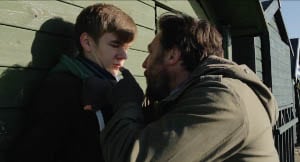 PH: Yeah, the screening last year was never really a public screening – it was there more as a cast and crew celebration of actually having a 85 minute film more or less finished, but that doesn’t sell well on a poster. I think the main changes were to shoot an extra scene that sits early on to give Rosie, who was one of the kid characters, a better introduction, which is funny as I’ve now moved this scene later on, so it’s not an introduction any more but a plot point [laughs]. Most of the rest of it was there – but I felt it dragged so there was a bit of streamlining and a bit of reordering of scenes. As it was a big ensemble piece this was do-able without changing the story too much. I pushed one of the characters more to the forefront and did a lot of sound design. Time consuming but ultimately it worked. It was just finding the time that has meant it has taken a while.
PH: Yeah, the screening last year was never really a public screening – it was there more as a cast and crew celebration of actually having a 85 minute film more or less finished, but that doesn’t sell well on a poster. I think the main changes were to shoot an extra scene that sits early on to give Rosie, who was one of the kid characters, a better introduction, which is funny as I’ve now moved this scene later on, so it’s not an introduction any more but a plot point [laughs]. Most of the rest of it was there – but I felt it dragged so there was a bit of streamlining and a bit of reordering of scenes. As it was a big ensemble piece this was do-able without changing the story too much. I pushed one of the characters more to the forefront and did a lot of sound design. Time consuming but ultimately it worked. It was just finding the time that has meant it has taken a while.
Scrawl was put together under the guise of me as a lecturer. I had worked as an independent filmmaker before this but had been working as a lecturer on a production course where I felt we weren’t really producing anything and that the students weren’t getting any real world experience so I decided to change that. Influenced by the likes of Brian De Palma making Home Movies to teach film production, I decided to attempt to do the same. The college [Andover College in Hampshire, UK] were extremely supportive of my madman approach and the majority of the students were fired up to stand in the freezing cold UK winters for days on end to achieve that goal. Despite some of the crew having not been students of mine for a year or so they’ve still been heavily invested in it all. It’s nice that they saw it as a real film as opposed to a student film, which i feel is a stigma it doesn’t need. It was a film created by students & professionals alike. I would count myself as one of those students as you are constantly learning!
Tough question. As you know as you’ve read various iterations of the script, what you’ve seen was not how Scrawl began. It began very much as an interwoven anthology-style film which was initially down to the way I thought we might end up shooting, essentially in blocks. I think there were about five stories that tied together quite well. I’m still proud of that script but it was not a script I felt I could film at that time, so I completely reworked it – I mean completely. Aside from maybe one scene, that other version of Scrawl could be shot tomorrow – a sequel of sorts. I think therefore all of the things you mention were as important as each other. The tone was very important, I didn’t want it to be too comedic but at the same time being po faced wouldn’t have worked. I have serious pictures in me but when your cast and crew are predominately 16 and 17 year olds you have to have a sense of fun there. The sound was very important but also tricky to pull off on a limited budget like we had, although I think we’ve got some nice design in there now. Pacing is the thing I spent tireless hours over, fine tuning, I think it rattles along now. 82 mins that feels a lot shorter is better than 82 mins that feels like hours longer. Look wise, ultimately you want your film to look nice but it had to serve the story so I was happy for it to look raw and worn in.
DL: Though undoubtedly a pretty original piece, I did detect an Evil Dead influence in your film. Any other films that you think either consciously or unconsciously made their way into the DNA of Scrawl?
PH: It was interesting with The Evil Dead as it was clearly an influence for me. When you decide to shoot a horror set partially in a wood setting, modelling a low budget shoot on something like Raimi’s The Evil Dead is a must. However very few of the students who worked on Scrawl had actually seen the film until it came time to shoot. I introduced Matty, the DP and editor to it as well as Joe who plays Joe, and they fell in love with it. As we moved through the shoot a bit of direction given to Joe and Matty was “let’s make our 00’s version of The Evil Dead“, so Joe was channelling Bruce Campbell a bit and Matty was tweaking his camera angles a bit just to give it a odder look as we moved further on in. I think it helped with both of them to be able to see something to aim for. In terms of other influences, aside from De Palma’s Home Movies there was a distinct Don Coscarelli vibe going on. Coscarelli’s Phantasm was the first horror I sat down to watch as I set to task with pre-production on this mainly due to the dream logic of those movies. I also threw a bit of John Dies at the End and Bubba Ho Tep in the mix. In fact overall Coscarelli was probably the biggest influence. There was also a bit of anarchic fun from Joe Dante and John Landis thrown in for good measure, and because everything I ever write seemingly has coastal towns that can be seen as a character, Steven Spielberg’s sense of awe, wonder and imagination looms as a big influence.
DL: I also noticed what seemed to me to be a Nicolas Roeg influence in some of the editing. Was this something planned early on or did the idea to do that come to you quite late in the day?
PH: I love Nic Roeg and a lot of the early edit was influenced by that style of editing which I’ve also seen to good effect in Soderbergh’s work and Ben Wheatley’s too, to name two great directors. I think because initially I was working with a very young [but very talented] editor, he couldn’t get his head around that style of editing – I mean a lot of people can’t get their heads around that style of editing – but I felt for at least one of the characters it was a vital part of the storytelling aspect for that character so I pushed for more of it until you have what you have. Which I think for this story works. So in answer, planned early – went around the houses – completed late.
DL: The majority of your cast members had never acted in front of a camera before and yet tended to be very natural in front of it. Did the performances tend to evolve organically or remain pretty much the same?
PH: Yeah, most hadn’t acted in front of a camera which I think for a number of them it was a blessing, because as soon as you become aware of what you look like, sound like, which way your hair falls, you start to second guess everything you do. I was fortunate enough to have some very talented and very game collaborators, many of who double-dutied in front of the camera and behind. By the time we got to the set these kids knew me and I knew them so it was easy to get them to play and feel at ease. The likes of Joe, another kid character, started off fairly reserved before getting totally into the character which works well as his character starts off fairly awkward before becoming something else. Annie, who plays a young character called Annie, again was another one that started off unsure – after all I had to cajole her in front of the camera as she was producing the film with me and didn’t really want to do it, but what can you do when the director writes a role that is you [laughs]? She’s great, and is starting to go to crew on other stuff, which is amazing to see, she’ll be huge one day. All the kids were fun to be around, they were friends on and off the set so again that helped for the idea that all these kids are growing up in a small town together.
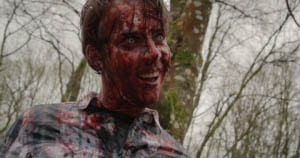 DL: I’m guessing that the news that Daisy Ridley was cast in Star Wars came out of the blue, or did you have an inkling?
DL: I’m guessing that the news that Daisy Ridley was cast in Star Wars came out of the blue, or did you have an inkling?
PH: Ha, I mean I wasn’t entirely surprised as Daisy and I had been exchanging messages via Twitter from the point where they announced they were looking to cast and I had made a comment that she certainly fit the criteria they were looking for. A lot of my tweets tend to have a snarky ironic tone to them so we’d chat for a bit and then have to delete the threads just in case she or I said something that put her out of the running. I just remember her sending me a message that said rather cryptically “I’ve had the meeting, nothing will come of it, but I had it” and I knew exactly what this meant. But I would be lying if I said I knew as she kept the cards very close to her chest, so I found out the same day everyone else did. Everyone asks “Isn’t it very surreal that you worked with her and now she’s in the biggest film franchise in the world?” I still don’t think it’s hit me that soon her face will be everywhere, I mean you always hope to work with actors and actresses that make a career for themselves by doing what they do best. From the moment I met her, talked about the script, showed her the short and told her I’d write a role for her, I knew there was something there, but I do that with all my castings. Some people just end up being very lucky. I wish her all the best and hope she continues to make those choices to have a fantastic career ahead of her. I am as proud today of Daisy as I was the day back April 2014 we all found out.
DL: Ignoring the various incarnations of the script, plus the late changes that had to take place due to the death of cast member Derek Jones who originally had a much larger part, did you tend to stick to your screenplay during shooting, or did you and others sometimes come up with changes ‘on the spot’?
PH: A bit of both. The script was there as a blueprint but I tried to get the actors to change anything that didn’t sound right coming out of their mouths or simplifying dialogue for when we were running short on time in locations. Quite a number of scenes were dictated to by the location, so changed if they didn’t quite fit, or in the case of the cabin sequence, we found the fork in there and decided to incorporate it into the scene. I like actors to feel fairly free on set and not be tied down to specific dialogue unless it is plot driven and needs to be there. I tend to aim for naturalism, even if the script calls for monsters to be popping out of comic books into real life. I mean, it could happen? [laughs]
DL: One of the things I most liked about Scrawl is that it is extremely bloody – I mean the red stuff really flows, especially in the second half – but that you actually imply more than you show and the viewer isn’t made to feel sick or turn away. Was this an artistic decision early on or something caused by budgetary restrictions?
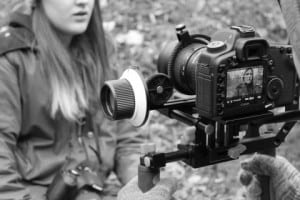 PH: We had made a short before Scrawl called Motto, which had an influence on making the changes to the earlier script to what we ultimately shot, and within thatwe had implied stuff because we only had a couple of hundred pounds to spend on it. Because it turned out really well I decided to use the same ideas on Scrawl. Yes we didn’t have a budget, and our original visual effects artist bailed the night before shooting was to begin so I had to think a bit on my feet and felt that to show everything would show the limitations of the budget, but to imply would ultimately fit better with the story we were trying to tell, but would also make the actual stuff you do see slightly more unnerving. We weren’t going for gross-out gore with the film, my idea was to harken back to the old fun 80’s horrors. Have a bit of gross followed by giggles.
PH: We had made a short before Scrawl called Motto, which had an influence on making the changes to the earlier script to what we ultimately shot, and within thatwe had implied stuff because we only had a couple of hundred pounds to spend on it. Because it turned out really well I decided to use the same ideas on Scrawl. Yes we didn’t have a budget, and our original visual effects artist bailed the night before shooting was to begin so I had to think a bit on my feet and felt that to show everything would show the limitations of the budget, but to imply would ultimately fit better with the story we were trying to tell, but would also make the actual stuff you do see slightly more unnerving. We weren’t going for gross-out gore with the film, my idea was to harken back to the old fun 80’s horrors. Have a bit of gross followed by giggles.
DL: Another favourite thing of mine about the film was the music score. Did that go through several incarnations? Did you always have the idea to incorporate the tune of The Teddy Bear’s Picnic?
PH: Yeah, Dan Hall was amazing! To get that score out of an untrained musician was fantastic. As mentioned before we shot Motto, to which initially my old composer, Neil Johnson, did a score for. We were looking for someone to score Scrawl and I went to Neil but he was far too busy with other commitments. He did give us a bit of music to temp with. We had another musician on for a bit who wrote some amazing pieces, but to see whether they had the right feel for the material I gave them Motto to rescore. When it came to it, Dan, who had come on the radar through me loaning him a camera for a separate project, did an amazing rescoring of Motto and I asked him to try The Teddy Bears Picnic in there as I felt it had the right tonal qualities for the childlike tormenting that was going on in the short and then into Scrawl. It seemed like an obvious fit, especially with what was happening narrative-wise. Dan also got my sensibilities about the John Carpenter/Brad Fiedel/Goblin electronic score – to give it the late 70s/ early 80s homage feel it needed.
DL: Scrawl is actually the third film you have directed. Do you think that directing a film gets easier the more experienced you get, or is it is always very difficult?
PH: It’s always very difficult. I always fool myself into saying “how hard can it be this time? I’ve done it before”, but it’s that long post production period that starts to sap your energy. I’m not able to spend all my waking hours on it as I have a day job, kids, a family. I’m not a carefree 20-something either. But I feel that if I’m able to summon enough energy to keep it together, growing and evolving over a three year period, some of those students half my age might look at it and go “hey I can do that, I’ve got more energy that old git” and get off their backsides and do their own projects and get their own careers kickstarted. It’s why I started the project in the first place, and it’s lovely to see those that were bitten by the bug and are making headway into their own careers based on the experiences they have had on Scrawl.
DL: Would you consider yourself an easy director to work for?
 PH: Yeah I would like to think so. I’m a fairly laid back person and try and bring that sense of “we’re all in it together” vibe to the set. None of us got paid to do this film and I feel and hope it’s testament to me as a director that a couple of the actresses cast I had worked with a number of times before. Nathalie Pownall and Elizabeth Boag I had known for about ten years as they both worked on my second feature Cross Eyed Waltz, and subsequently I have now worked with Nat four times and Liz three times. They didn’t need to do it as they weren’t getting paid but I feel they saw the value in it and the experience, plus they are both amazing. I feel though I’ve used up all of my ‘get out of jail free’ cards with these guys, next time they need to be paid like a proper paid job if they work with me.
PH: Yeah I would like to think so. I’m a fairly laid back person and try and bring that sense of “we’re all in it together” vibe to the set. None of us got paid to do this film and I feel and hope it’s testament to me as a director that a couple of the actresses cast I had worked with a number of times before. Nathalie Pownall and Elizabeth Boag I had known for about ten years as they both worked on my second feature Cross Eyed Waltz, and subsequently I have now worked with Nat four times and Liz three times. They didn’t need to do it as they weren’t getting paid but I feel they saw the value in it and the experience, plus they are both amazing. I feel though I’ve used up all of my ‘get out of jail free’ cards with these guys, next time they need to be paid like a proper paid job if they work with me.
I’ve been incredibly lucky with the cast and crew I got to work with, beyond those I’ve mentioned so far. Mark Forester Evans for example, who was one of the actors we got onboard and plays Frank in the film, has been incredibly supportive since day one and continues to be to this day. He’s not only been someone that’s pushed me on to grow and develop the project but has been immensely supportive of other members of crew that have gone onto film school, by doing short films for them. You wish for collaborators like this on projects such as this that are interested beyond “how do I look?” and I’ve been blessed with many here.
DL: Filmmakers often say that their films rarely match their visions entirely. Alfred Hitchcock once said that he was lucky if 60% of what he intended for a film actually ended up on screen. Would you say that you are mostly satisfied with Scrawl now that it’s completed?
PH: Seeing that I was changing things after the point at which you saw the film I’m never going to be entirely satisfied with anything I work on, but Scrawl is as complete as it’s ever going to be and I’m proud of it, and happy with the way it is now. I think the film is fairly faithful to the script in certain areas but grew and developed as we worked on the filming and then ultimately the post production period. It’s hopefully a fun film with energy and inventiveness to match – it was never intended to be a glossy and slick blockbuster, but it was designed to go from blank page to festival circuit, which we are aiming for now. The Star Wars news just put us in the public eye a bit more
PH: We’ve put together a few features for an intended DVD release. Whether that’s a homespun release that we’ll put out ourselves or something bigger I do not know as yet, but there will be a way for it to be watched soon. As for festivals, ultimately that was my initial goal, and we have the film in contention for festivals, but it’s all a waiting game. I would love for it to play places but we will just have to wait and see if our sensibilities match those of the festival gatekeepers.
DL: You mentioned some interesting sounding projects you are working on or considering last time.Anything else in the pipeline?
PH: Here’s a cliche for you – “I’ve got a number of projects in various states of development” [laughs] – it’s mainly genre stuff but I’ll have to see what happens. I’d love to do more, I’ve been in and out of filmmaking for the past 20 years so I’m at that point now where I’ll see where it all takes me. I’ve still a hunger for it all, and I hope with Scrawl I can show that I have a voice too. There are a number of ideas id like to tackle next. I’ve got a great script which is like a classic Carpenter idea meeting 80’s Amblin; a fresh spin on a Frankenstein-type film, a werewolf drama revolving around a kid and his family. A sci-fi film that could be fun. I’ve also got a great holiday horror idea that would be fun to develop further. I’ve always written and directed my own stuff, so it would be nice to play in someone else’s sandbox for a while or for someone to play in mine. I have a quasi-sequel to Scrawl that I’d like to do at some point, but who knows? Let’s see what happens…
DL: For the second time, HorrorCultFilms would like to thank you for your time and wish you all the best with Scrawl.
PH: Ta buddy.
You can read my review of Scrawl here: https://horrorcultfilms.co.uk/2015/08/scrawl-2015/

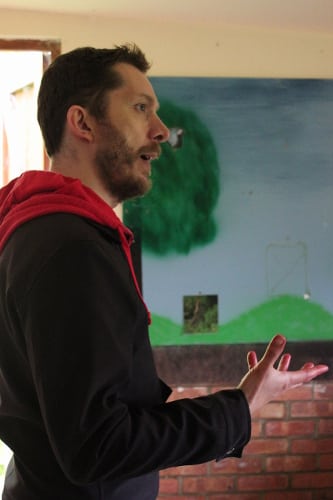
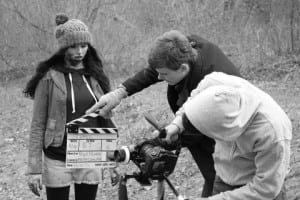
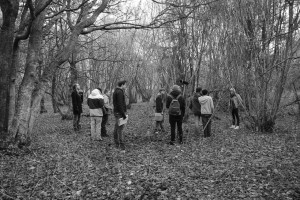
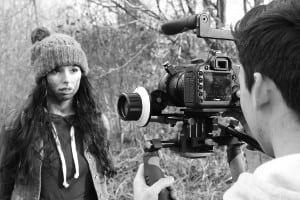



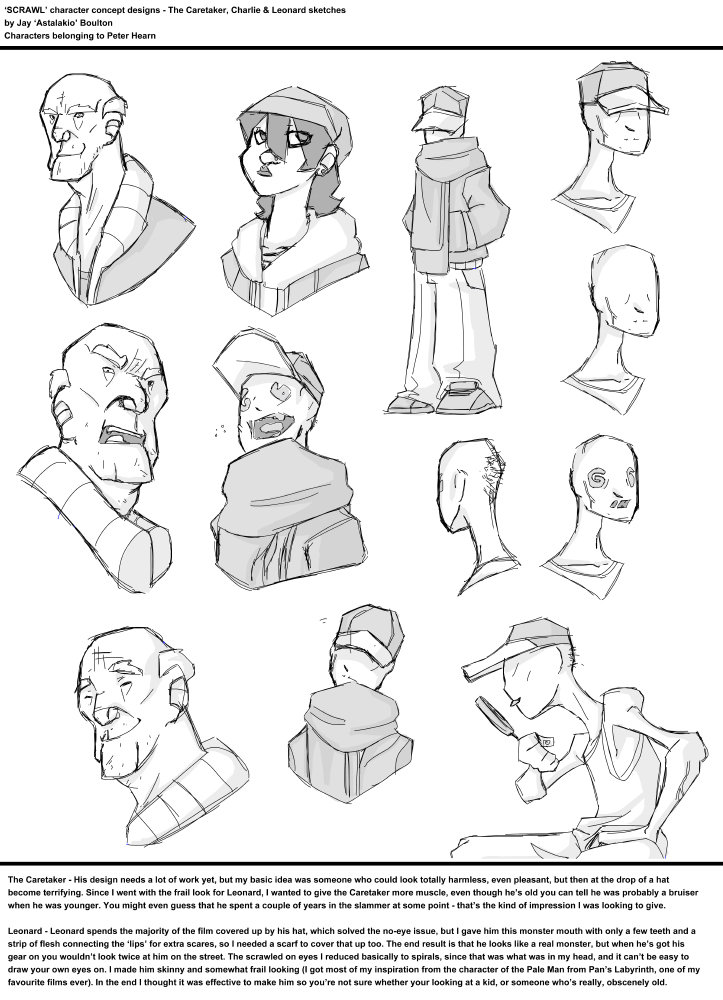
Be the first to comment